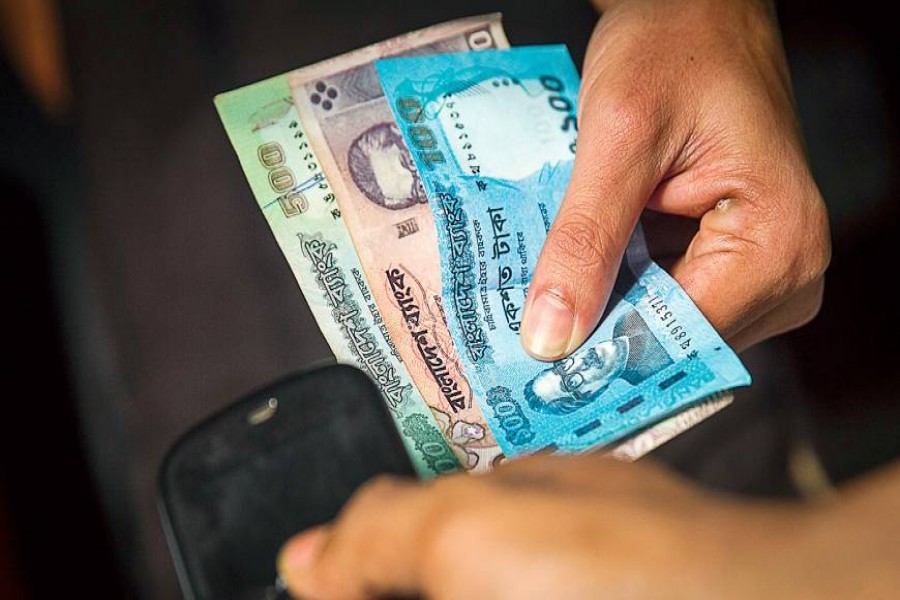A couple of weeks back two friends from Portugal came to see this writer. Both of them come from a finance background and works with the policy-makers of financial institutions in Eastern Europe region. While roaming around Dhaka, they were amazed seeing the prolific presence of agent banking across the city. In addition, this writer also tried to enlighten them with a brief snippet of the mobile financial service (MFS) policy framework and how fast we have reached to today's stage which is exemplary! After a constructive discussion regarding MFS, one of our friends came up with two genuine queries: how do the MFS platform operates in Bangladesh where there is no policy in place? Is the present revenue sharing model between MFS providers and mobile network operators (MNOs) is sustainable? His queries are undoubtedly thought-provoking and thus, inspired this scribe to write something on it.
'Banking is essential, banks are not' - has turned to be a cliché in the domain of financial inclusion lately. While it is a proven research outcome that financial inclusion reduces the inequality (which is also one of the targets of sustainable development goals i.e. SDG) and brings in acceleration to the economy, we are struggling to improve in this aspect. The information communication technology (ICT) strategy of the 'Seventh Five-year Plan' encircles around emphasising on financial inclusion by reducing transaction cost of the end users. It also aims to integrate financial inclusion with National Social Security Strategy (NSSS). This integration necessitates Bangladesh Bank to establish a whole new 'Financial Inclusion Department'. But unfortunately, despite having considerable paper works and discussions been done so far, only 34 per cent people are now under the umbrella of financial inclusion (www.finclusion.org). If 'no one left behind' is to be achieved by 2020, a miracle has to be done. At the point of time when we should be focusing on the way forward to faster penetration of financial inclusion through innovative and viable propositions, we are simultaneously struggling to resolve vital and trivial issues. Bangladesh Bank is yet to finalise the regulatory guidelines for mobile financial services (drafted back in August, 2015) which this writer reckons to be a vital one. On the other hand, pricing model for USSD (unstructured supplementary service data) remains unresolved since its inception which this writer considers to be a trivial one. An explanation of 'why' for the latter one is being attempted here.
Since commencement, mobile financial service providers are using MNOs' network taking the service to the mass people. In the early stage, as obvious, the service started in somewhat unstructured or ad-hoc manner. Back in 2011, with little or no policy framework on mobile financial service in place, MFS providers and MNOs started the service in a revenue sharing model. The then ad-hoc practice was to share 7.0 per cent revenue of MFS providers to the MNOs derive from 1.85 per cent of transfer charge which, in turn, became an established practice. Interestingly, the concept of '7.0 per cent revenue sharing' came into action without any proper research. Even if it is not derived from any research or analysis, this '7.0 per cent revenue sharing' entirely lies between MNOs and MFS service providers' commercial arrangement and business model; nothing to do with the end users, whatsoever.
If there is any necessity of changing the business model that must not affect the end users and must be adjusted from the portion between MNOs and MFS providers. Another notable aspect of this current practice is the loosely coupled intention of denial of MNOs' network usage by the MFS providers. On an average, 100 million SMS and 1300 million USSD sessions (one transfer meaning one session) are generated every day for the money transfer service providers and surely the number of SMS and session will increase until it becomes app-based. These SMS and USSD sessions are creating a considerable pressure on the MNOs network.
But MNOs are being paid only for the transactions which are revenue generating in nature though USSD service is used for both revenue or non-revenue generating transactions. Besides, associated SMSs are absolutely free of cost. Certainly, this is not a viable case for MNOs and only through compulsion it can sustain. Concurrently, it leaves questions around transparency too.
It's worth mentioning here, countries having economies similar to Bangladesh had introduced the session-based practice since inception. India, Cambodia, Kenya are a few to mention. Session-based charge proposed by the MNOs will be the lowest among all countries (with two free SMS). We need to bear it in mind that business models are never static; it is dynamic and it has to be. Based on customer needs, ever-changing ecosystem and dramatic change of technology, the business model is be flexible enough and adaptive thereby.
With ever-increasing demand for mobile banking, the daily transaction has reached well over BDT 10 billion (1000 crore) as of July, 2017. We are already late to cope up with the fast-paced changing environment of financial sector. Mere sending and receiving money is not world of mobile/online banking. It is just a tiny part of the whole value-chain. Policy-makers should have had finalised the MFS guidelines long ago. With a view to making the MFS policy ever-future-proof, the central bank has come up with a very complex partnership model. This has not only discouraged the investors to invest, it has also slowed down the whole process. Without investment, innovation seldom comes.
We haven't experienced any notable innovation in the MFS domain. They are also overcautious in taking any steps that involves mobile/online transaction. Moreover, this writer feels there is a lack of credibility among the policy-makers, MFS providers and the MNOs.
If we believe in digitisation and 'mobile' to be the 'miracle vehicle' of financial inclusion, we must settle down the vital and trivial issues without any farther delay. And policy-makers should play a supportive role allowing the market dynamics to determine the appropriate and sustainable model.
The writer is a Visiting Faculty, Jahangirnagar University.


